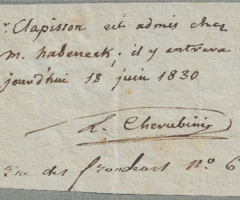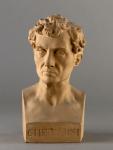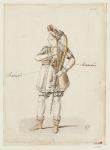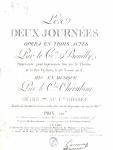
Luigi CHERUBINI
1760 - 1842
Composer
Although born in Florence, Cherubini remains a prominent figure of the French school in the first half of the 19th century. His reputation as a composer suffered due to the enemies he made as director of the Paris Conservatoire (1822-1842). The unmistakable fact remains, however, that he was an influential composer, penning over thirty operas, as well as a great deal of chamber music and many religious and symphonic works. The son of a theatre musician who taught him counterpoint, he made his debut fairly quickly in Florence, then in London and Turin. In 1785, in Paris, he was introduced to Marie-Antoinette through the violinist Viotti and became a member of the Société Olympique, a concert society similar to a Freemasons’ lodge, frequented by the French aristocracy. Despite this, his first composition for the Académie Royale de Musique, Démophon (1788), was not an out-and-out success. In 1789, he became co-director of the Théâtre de Monsieur, the future Théâtre Feydeau. It was there that he staged first performances of his main masterpieces: Lodoïska (1791), Élisa (1794), Médée (1797), L’Hôtellerie portugaise (1797) and Les Deux Journées (1800). Although his opéra-ballet Anacréon ou L’Amour fugitif (1803) shows a complete mastery of his art at the dawn of the First French Empire, Cherubini nevertheless found himself kept away from Parisian stages due to his counter-revolutionary reputation and his difficult relationship with Napoléon. In fact, his institutional career only really took off under the Restoration, in particular with his appointment to the post of superintendent at the Chapelle Royale (1814) and his election to the Institut de France (1815).
Focus
Focus
Napoleon and music
Works
Eliza ou Le Voyage aux Glaciers du Mont St-Bernard
Luigi CHERUBINI / Jacques-Antoine de RÉVÉRONI SAINT-CYR
1794
Documents and archives

Correspondence, Manuscript document











